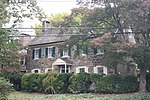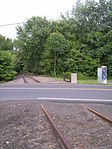Hampton Hill (Richboro, Pennsylvania)
Bucks County, Pennsylvania Registered Historic Place stubsHouses completed in 1790Houses in Bucks County, PennsylvaniaHouses on the National Register of Historic Places in PennsylvaniaHouses on the Underground Railroad ... and 3 more
National Register of Historic Places in Bucks County, PennsylvaniaPopulated places on the Underground RailroadUnderground Railroad in Pennsylvania

Hampton Hill, also known as the Bennet-Search House, is a historic home located at Richboro, Northampton Township, Bucks County, Pennsylvania. The first section was built about 1744, and is a 2+1⁄2-story, two-bay by one-bay, stone house with a gable roof. The larger section was built about 1790, and is a 2+1⁄2-story, three-bay by two-bay, stone house with a gable roof. The roof was covered with slate in the 20th century. The house is thought to have harbored slaves on the Underground Railroad.It was added to the National Register of Historic Places in 1973.
Excerpt from the Wikipedia article Hampton Hill (Richboro, Pennsylvania) (License: CC BY-SA 3.0, Authors, Images).Hampton Hill (Richboro, Pennsylvania)
2nd Street Pike, Northampton Township
Geographical coordinates (GPS) Address Nearby Places Show on map
Geographical coordinates (GPS)
| Latitude | Longitude |
|---|---|
| N 40.223611111111 ° | E -75.009444444444 ° |
Address
2nd Street Pike 1249
18954 Northampton Township
Pennsylvania, United States
Open on Google Maps









